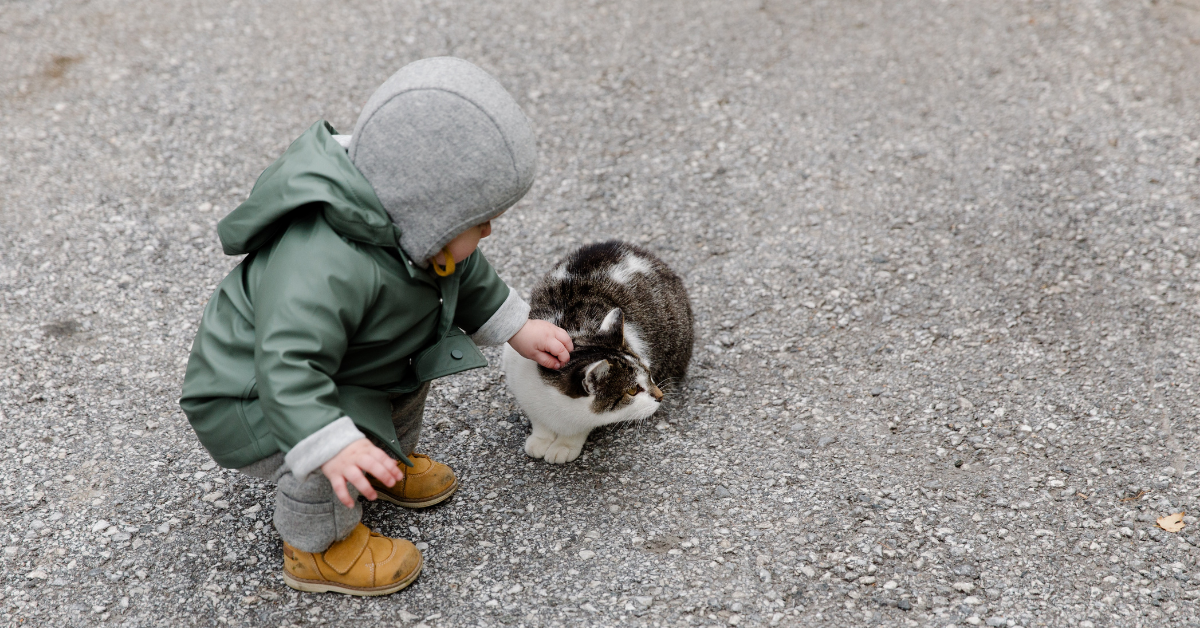
New Babies and Pets
You are expecting a new addition to your family…the human kind. Congratulations! This is always a very exciting time and a lot of time and effort goes into preparing yourselves for the baby’s arrival. Keep in mind that you also need to prepare the family pet for the new addition. Following are some steps to take to make the introduction go smoothly.
Before your baby arrives, make sure your pet is healthy. Take them in for a complete exam. They should be up to date on vaccines and checked for parasites. If they are not already spayed or neutered, you should have this done. It will make them calmer around the baby. Make sure that they are kept well groomed. This will help eliminate excess hair in the home. It is very important to keep their nails trimmed so they won’t accidentally scratch the baby.
Enroll your dog in an obedience class. Before your baby arrives, the dog should be very familiar with the “sit”, “stay”, and “leave it” commands. You may also want to consider crate training for times when your pet may be too excited to be around the baby. Never use a crate as punishment, though. Your dog should consider the crate his “safe spot”.
Once your dog responds well to the commands mentioned above, have friends or family members with infants come to your house. The first time your dog is introduced to a baby, you may want to keep them on a leash until you see how they are going to respond. Don’t let the dog go up to the baby. Put them in a down-stay position. The idea here is to get the dog used to having a baby around. Once the dog seems okay with the baby, it’s ok to let them off leash, but they need to be closely supervised. They still should not be allowed to approach the baby.
Familiarize your pet with baby items; especially items that move or make sounds such as a swing or rocker. Use positive reinforcement to get your dog accustomed to such items. Make them sit by the item and then make it move. Use treats and a soothing voice while doing so. Never force your pet to approach an item that makes it nervous. This will only make it worse. Try making the item move with the dog sitting on the other side of the room, again using a quiet, calm voice. They should eventually warm up to it.
Also familiarize your pet with the sights, smells and sounds of a baby. Play a recording of a baby crying a few times a day. Start at a low volume and gradually increase it. Wrap a doll in blankets and carry it around the house. Apply some baby oil and baby powder to it. You may also want to use baby oil and/or powder on yourself to help your pet become accustomed to the new smells.
You should never allow your pets in the baby’s room, before or after the baby comes home. Block the doorway with a barrier that they cannot push down, jump over, crawl under or pass in any way. If you have baby items such as a changing table or cradle in other parts of the house, never allow the pet to jump up on them.
Once the baby is born but before bringing him/her home for the first time, let your pet smell something with the baby’s scent on it. This should be done before introducing the baby, so they are familiar with the baby’s scent. When bringing the baby home from the hospital, have somebody else carry the baby into the house so you can greet your pet properly. Greet them as you always would with lots of praise.
The first time your baby and pet are introduced, have your pet sit quietly by the baby and reward them for calm behavior. If the pet doesn’t respond to the baby in a proper manner, remove the pet from the area, but do not punish them. This may have to be repeated a few times until the pet “gets it”. If the pet doesn’t want to greet the baby at first, don’t force it.
If your pet growls, nips or hisses at the baby, use a strong verbal command (“NO”!) and remove the pet from the area. NEVER use physical violence on the pet; this will only make it worse.
Pets should not be allowed to sleep in the same room as the baby, even with you present. There have been reports of family pets accidentally suffocating babies by lying on top of them. NEVER leave your pet unattended with the baby; even for a moment. This cannot be stressed enough. Even the calmest, most well behaved pet can do harm to a baby unintentionally.
Don’t allow your pet to lick the baby. You know where that tongue has been. Yuk!
Be sure to give your pets lots of attention. Make time every day to play with them one-on-one. While the baby is napping, is the perfect time to spend quality time with your pet. If your pet is used to getting daily walks, these should continue and always strive to maintain your pet’s routine.
For additional information, visit the Humane Society (http://www.humanesociety.org/animals/resources/tips/pets_babies.html).






